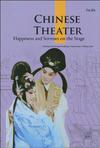中国戏剧
出版时间:2010-1 出版社:五洲传播出版社 作者:傅谨 页数:153
前言
China is a country with multiple theatricalactivities spreadover its vast area. Currently,Chinese traditional opera(xiqu), an integration o!singing and performance, isthe most common, unique andrepresentative form of Chinesetheater.Chinese traditional operaoriginated in the 12th century.Compared with ancient Greekand Indian Sanskrit drama, itwas born rather late but withmore exuberant vitality. Overmore than 800 years, Chinesetraditional opera has maintained its basic form, therefore, amongthe existing types of drama, Chinese traditional opera may havethe longest history.Rich in history and charm in artistic expression, traditionalopera is deeply loved by ancient Chinese people. A formula isextensively used in Chinese traditional opera performances, witha special music metric and regulated singing.
内容概要
China is a country with multiple theatrical activities spread over its largearea. Chinese traditional opera, an integration of singing and performance, is the most common, unique and representative form of Chinese theater. Over more than 800 years, it has maintained its basic form .In the beginning of the 20th century, subject to the impact of the West, the modern drama without singing appeared in China. The development and prosperity of modern drama has added a new landscape for Chinese the ater, which, as a whole, has become more diversified.
作者简介
Fu Jin Born in Quzhou, Zhejiang Province in1956. Doctor of Literature, professor of the National Academy of Chinese Theater Arts,pluralistic researcher of Institute of Chinese Intangible Cultural Heritage, Sun Yatsen University, advisor for Ph.D. candidate of China Art Academy. His academic works include The Modernization and Localization of Chinese Theater, Introduction to Chinese Theater in the 20th Century, History of Chinese The ater,Treatise on Art of Chinese Theater, etc.
书籍目录
ForewordPrelude: the Origins of Chinese Theater Sacrifice and Entertainer The Spectacular Scene of Music and Dance Xinong and the Art of Singing with SpeakingPeaks Towering Magnificently: Song Xiwen and Yuan Zaju Southern Xiwen during the Song Dynasty The Prosperity ofYuan Zaju Guan Hanqing's Remarkable AchievementRefinement and Elegance: Chuanqi of the MinR and Qing Dynasties and the Times of Kunqu Opera Scholars' Renovate of Xiwen Kunqu Opera and Exquisite Peony Pavilion Palace of Eternity and Peach Blossom Fan Li Yu and Kunqu Opera Stage PerformancesFlowers in Bloom: Diversified Opera Varieties Spread of Yiyang Tune and Clapper Opera Competition between Huabu and Yabu From Playlet to Big Opera Modern Play and Stage PlayWith Ups and Downs: Extending Its Global Presence New Stage Mei Lanfang——Going to the World Improvement to the Traditional Opera and "Model Opera" Forward-looking Chinese TheaterAppendix: Chronological Table of the Chinese Dynasties
章节摘录
插图:Emerging during the Song Dynasty, the earliest mature the ater in China flourished in Zhejiang and was called Wenzhou zaju. It was sharply different from Song Jin zaju in two ways. On the one hand, actors in Song Jin zaju didn't necessarily play fixed roles whose main purpose was to make fun. On the other, it was a small-sized xinong without complete stories.During the late Southern Song Dynasty (1127-1279), new the ater emerged with set length and complete stories in which actorsp layed dramatic roles and performed by various means including speech and song. Moreover, such performances maintained the irbasic forms to the present day. The highly sophisticated the aterstyle during the Southern Song Dynasty emerged in Wenzhou and flourished in southern area of the Yangtze River and was known as"southern tune xiwen" or simply referred to as "xiwen."The earliest complete script was found and repurchased in1920 in a small antique shop in London by scholar Ye Gongchuo.It included works such as The No.1 Scholar Zhang Xie (ZhangXie Zhuang Yuan), The Butcher (Xiao Sun Tu) and Wrong Career of Official's Son (Huan Men Zi Di Cuo Li Shen).The No.1 Scholar Zhang Xie was compiled by the scholars in the Jiushan Club in Wenzhou during the Southern Song Dynasty. During this period, xiwen performances were very popular inWenzhou and literary societies were common. The Jiushan Club,a professional group for script writing, was also founded. Theclub was very active. For instance, when a monk named Zu Jie inWenzhou did all kinds of evil things under the asylum of local officials, the club members immediately compiled a xiwen scriptbased on the monks' misdemeanors and performed it in public. The theater then aroused the anger of the local population, for cingthe government to uphold justice and punish the evil monk.
编辑推荐
《中国戏剧(英文)》由五洲传播出版社出版。
图书封面
评论、评分、阅读与下载
用户评论 (总计0条)
推荐图书
- 2012陈先奎教授考研思想政治系列
- 2012版-陈先奎考研政治系列-《思想政治理论基础过关2000题》
- 执业医师资格考试实践技能图解
- 中国版权相关产业的经济贡献
- 电工学
- 钢筋工程量计算
- 儿科护理学
- 吴冠中自选速写集
- 淘金六级听力20天20套
- 大学英语6级考试听力模拟+真题
- 鲁商文化史
- 一片雪(全二册)
- 多维视野中的印度文学文化
- 海盗在前,家在后
- 广州画院历年获奖优秀作品集
- 新农村建设中的村级党组织建设
- 苏州园林名胜旧影录
- 60天攻克高考英语阅读
- 美味厨房第二辑06-爽口凉拌菜
- 小学生10分钟口算测试100分(4年级下)
- 肿瘤放疗100问
- 合成孔径雷达图像海洋内波探测
- 外国文学鉴赏辞典大系(盒装15册)
- 日本蓬莱纹铜镜研究 (平装)
- 图解文学常识
